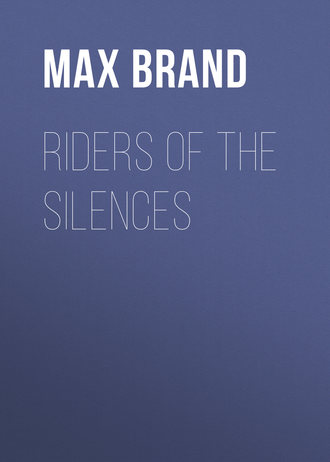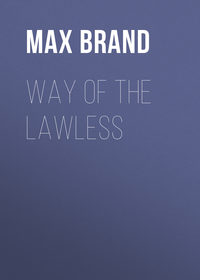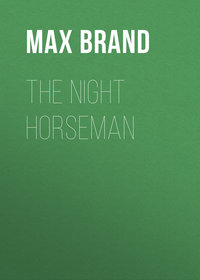 полная версия
полная версияRiders of the Silences
She said in that voice: "No; of course she didn't dream it."
"And you, Jack, had her interests at heart—her best interests, poor girl, and didn't tell her?"
Her hands went out to him in mute appeal.
"Please, Pierre—don't!"
"Is something troubling you, Jack?"
"You are breaking my heart."
"Why, by no means! Let's sit here calmly and chat about the girl with the yellow hair. To begin with—she's rather pleasant to look at, don't you think?"
"I suppose she is."
"Hm! Rather poor taste not to be sure of it. Well, let it go. You've always had rather queer taste in women, Jack; but, of course, being a long-rider, you haven't seen much of them. At least her name is delightful—Mary Brown! You've no idea how often I've repeated it aloud to myself—Mary Brown!"
"I hate her!"
"You two didn't have a very agreeable time of it? By the way, she must have left in rather a hurry to forget her glove, eh?"
"Yes, she ran—like a coward."
"Ah?" "Like a trembling coward. How can you care for a white-faced little fool like that? Is she your match? Is she your mate?"
He considered a moment, as though to make sure that he did not exaggerate.
"I love her, Jack, as men love water when they've ridden all day over hot sand without a drop on their lips—you know when the tongue gets thick and the mouth fills with cotton—and then you see clear, bright water, and taste it?
"She is like that to me. She feeds every sense; and when I look in her eyes, Jack, I feel like the starved man on the desert, as I was saying, drinking that priceless water. You knew something of the way I feel, Jack. Isn't it a little odd that you didn't keep her here?"
She had stood literally shuddering during this speech, and now she burst out, far beyond all control: "Because she loathes you; because she hates herself for ever having loved you; because she despises herself for having ridden up here after you. Does that fill your cup of water, Pierre, eh?"
His forehead was shining with sweat, but he set his teeth, and, after a moment, he was able to say in the same hard, calm voice: "I suppose there was no real reason for her change. She can be persuaded back to me in a moment. In that case just tell me where she has gone and I'll ride after her."
He made as if to rise, but she cried in a panic, and yet with a wild exultation: "No, she's done with you forever, and the more you make love to her now the more she'll hate you. Because she knows that when you kissed her before—when you kissed her—you were living with a woman."
"I—living with a woman?"
Her voice had risen out of the whisper for the outbreak. Now it sank back into it.
"Yes—with me!" "With you? I see. Naturally it must have gone hard with her—Mary! And she wouldn't see reason even when you explained that you and I are like brothers?"
He leaned a little toward her and just a shade of emotion came in his voice.
"When you carefully explained, Jack, with all the eloquence you could command, that you and I have ridden and fought and camped together like brothers for six years? And how I gave you your first gun? And how I've stayed between you and danger a thousand times? And how I've never treated you otherwise than as a man? And how I've given you the love of a blood-brother to take the place of the brother who died? And how I've kept you in a clean and pure respect such as a man can only give once in his life—and then only to his dearest friend? She wouldn't listen—even when you talked to her like this?"
"For God's sake—Pierre!"
"Ah, but you talked well enough to pave the way for me. You talked so eloquently that with a little more persuasion from me she will know and understand. Come, I must be gone after her. Which way did she ride—up or down the valley?"
"You could talk to her forever and she'd never listen. Pierre, I told her that I was—your woman—that you'd told me of your scenes with her—and that we'd laughed at them together."
She covered her eyes and crouched, waiting for the wrath that would fall on her, but he only smiled bitterly on the bowed head, saying: "Why have I waited so long to hear you say what I knew already? I suppose because I wouldn't believe until I heard the whole abominable truth from your own lips. Jack, why did you do it?"
"Won't you see? Because I've loved you always, Pierre!"
"Love—you—your tiger-heart? No, but you were like a cruel, selfish child. You were jealous because you didn't want the toy taken away. I knew it. I knew that even if I rode after her it would be hopeless. Oh, God, how terribly you've hurt me, partner!"
It wrung a little moan from her. He said after a moment: "It's only the ghost of a chance, but I'll have to take it. Tell me which way she rode? No? Then I'll try to find her."
She leaped between him and the door, flinging her shoulders against it with a crash and standing with outspread arms to bar the way.
"You must not go!"
He turned his head somewhat.
"Don't stand in front of me, Jack. You know I'll do what I say, and just now it's a bit hard for me to face you."
"Pierre, I feel as if there were a hand squeezing my heart small, and small, and small. Pierre, I'd die for you!"
"I know you would. I know you would, partner. It was only a mistake, and you acted the way any coldhearted boy would act if—if someone were to try to steal his horse, for instance. But just now it's hard for me to look at you and be calm."
"Don't try to be! Swear at me—curse—rave—beat me; I'd be glad of the blows, Pierre. I'd hold out my arms to 'em. But don't go out that door!"
"Why?"
"Because—if you found her—she's not alone."
"Say that slowly. I don't understand. She's not alone?"
"I'll try to tell you from the first. She started out for you with Dick Wilbur for a guide."
"Good old Dick, God bless him! I'll fill all his pockets with gold for that; and he loves her, you know."
"You'll never see Dick Wilbur again. On the first night they camped she missed him when he went for water. She went down after a while and saw the mark of his body on the sand. He never appeared again."
"Who was it?"
"Listen. The next morning she woke up and found that someone had taken care of the fire while she slept, and her pack was lashed on one of the saddles. She rode on that day and came at night to a camp-fire with a bed of boughs near it and no one in sight. She took that camp for herself and no one showed up.
"Don't you see? Someone was following her up the valley and taking care of the poor baby on the way. Someone who was afraid to let himself be seen. Perhaps it was the man who killed Dick Wilbur without a sound there beside the river; perhaps as Dick died he told the man who killed him about the lonely girl and this other man was white enough to help Mary.
"But all Mary ever saw of him was that second night when she thought she saw a streak of white, traveling like a galloping horse, that disappeared over a hill and into the trees—"
"A streak of white—"
"Yes, yes! The white horse—McGurk!"
"McGurk!" repeated Pierre stupidly; then: "And you knew she would be going out to him when she left this house?"
"I knew—Pierre—don't look at me like that—I knew that it would be murder to let you cross with McGurk. You're the last of seven—he's a devil—no man—"
"And you let her go out into the night—to him."
She clung to a last thread of hope: "If you met him and killed him with the luck of the cross it would bring equal bad luck on someone you love—on the girl, Pierre!"
He was merely repeating stupidly: "You let her go out—to him—in the night! She's in his arms now—you devil—you tiger—"
She threw herself down and clung about his knees with hysterical strength.
He tore the little cross from his neck and flung it into her upturned face.
"Don't make me put my hands on you, Jack. Let me go!" There was no need to tear her grasp away. She crumpled and slipped sidewise to the floor. He leaned over and shook her violently by the shoulder.
"Which way did she ride? Which way did they ride?"
She whispered: "Down the valley, Pierre; down the valley; I swear they rode that way."
And as she lay in a half swoon she heard the faint clatter of galloping hoofs over the rocks and a wild voice yelling, fainter and fainter with distance: "McGurk!"
CHAPTER 34
It came back to her like a threat; it beat at her ears and roused her, that continually diminishing cry: "McGurk!" It went down the valley, and Mary Brown, and McGurk with her, perhaps, had gone up the gorge, but it would be a matter of a short time before Pierre le Rouge discovered that there was no camp-fire to be sighted in the lower valley and whirled to storm back up the canyon with that battle-cry: "McGurk!" still on his lips.
And if the two met she knew the result. Seven strong men had ridden together, fought together, and one by one they had fallen, disappeared like the white smoke of the camp-fire, jerked off into thin air by the wind, until only one remained.
How clearly she could see them all! Bud Mansie, meager, lean, with a shifting eye; Garry Patterson, of the red, good-natured face; Phil Branch, stolid and short and muscled like a giant; Handsome Dick Wilbur on his racing bay; Black Gandil, with his villainies from the South Seas like an invisible mantle of awe about him; and her father, the stalwart, gray Boone.
All these had gone, and there remained only Pierre le Rouge to follow in the steps of the six who had gone before.
She crawled to the door, feeble in mind and shuddering of body like a runner who has spent his last energy in a long race, and drew it open. The wind blew up the valley from the Old Crow, but no sound came back to her, no calling from Pierre; and over her rose the black pyramid of the western peak of the Twin Bears like a monstrous nose pointing stiffly toward the stars.
She closed the door, dragged herself back to her feet, and stood with her shoulders leaning against the wall. Her weakness was not weariness—it was as if something had been taken from her. She wondered at herself somewhat vaguely. Surely she had never been like this before, with the singular coldness about her heart and the feeling of loss, of infinite loss.
What had she lost? She began to search her mind for an answer. Then she smiled uncertainly, a wan, small smile. It was very clear; what she had lost was all interest in life and all hope for the brave tomorrow. Nothing remained of all those lovely dreams which she had built up by day and night about the figure of Pierre le Rouge. He was gone, and the bright-colored bubble she had blown vanished at once.
She felt a slight pain at her forehead and then remembered the cross which Pierre had thrown into her face. Casting that away he had thrown his faintest chance of victory with it; it would be a slaughter, not a battle, and red-handed McGurk would leave one more foe behind him.
But looking down she found the cross and picked up the shining bit of metal; it seemed as if she held the greater part of Pierre le Rouge in her hands. She raised the cross to her lips.
When she fastened the cross about her throat it was with no exultation, but like one who places over his heart a last memorial of the dead; a consecration, like the red sign or the white which the crusaders wore on the covers of their shields.
Then she took from her breast the spray of autumn leaves. He had not noticed them, yet perhaps they had helped to make him happy when he came into the cabin that night, so she placed the spray on the table. Next she unpinned the great rubies from her throat and let her eye linger over them for a moment. They were chosen stones, a lure and a challenge at once.
The first thought of what she must do came to Jacqueline then, but not in an overwhelming tide—it was rather a small voice that whispered in her heart.
Last, she took from her bosom the glove of the yellow-haired girl. Compared with her stanch riding gloves, how small was this! Yet, when she tried it, it slipped easily on her hand. This she laid in that little pile, for these were the things which Pierre would wish to find if by some miracle he came back from the battle. The spray, perhaps, he would not understand; and yet he might. She pressed both hands to her breast and drew a long breath, for her heart was breaking. Through her misted eyes she could barely see the shimmer of the cross.
She dropped to her knees, and twisted her hands together in agony. It was prayer. There were no words to it, but it was prayer, a wild appeal for aid.
That aid came in the form of a calm that swept on her like the flood of a clear moonlight over a storm-beaten landscape. The whisper which had come to her before was now a solemn-speaking voice, and she knew what she must do. She could not keep the two men apart, but she might reach McGurk before and strike him down by stealth, by craft, any way to kill that man as terrible as a devil, as invulnerable as a ghost.
This she might do in the heart of the night, and afterward she might have the courage left to tell the girl the truth and then creep off somewhere and let this steady pain burn its way out of her heart.
Once she had reached a decision, it was characteristic that she moved swiftly. Also, there was cause for haste, for by this time Pierre must have discovered that there was no one in the lower reaches of the gorge and would be galloping back with all the speed of the cream-colored mare which even McGurk's white horse could not match.
She ran from the cabin and into the little lean-to behind it where the horses were tethered. There she swung her saddle with expert hands, whipped up the cinch, and pulled it with the strength of a man, mounted, and was off up the gorge.
For the first few minutes she let the long-limbed black race on at full speed, a breathless course, because the beat of the wind in her face raised her courage, gave her a certain impulse which was almost happiness, just as the martyrs rejoiced and held out their hands to the fire that was to consume them; but after the first burst of headlong galloping, she drew down the speed to a hand-canter, and this in turn to a fast trot, for she dared not risk the far-echoed sound of the clattering hoofs over the rock.
And as she rode she saw at last the winking eye of red which she longed for and dreaded. She pulled her black to an instant halt and swung from the saddle, tossing the reins over the head of the horse to keep him standing there.
Yet, after she had made half a dozen hurried paces something forced her to turn and look again at the handsome head of the horse. He stood quite motionless, with his ears pricking after her, and now as she stopped he whinnied softly, hardly louder than the whisper of a man. So she ran back again and threw the reins over the horn of the saddle; he should be free to wander where he chose through the free mountains, but as for her, she knew very certainly now that she would never mount that saddle again, or control that triumphant steed with the touch of her hands on the reins. She put her arms around his neck and drew his head down close.
There was a dignity in that parting, for it was the burning of her bridges behind her. She drew back, the horse followed her a pace, but she raised a silent hand in the night and halted him; a moment later she was lost among the boulders.
It was rather slow work to stalk that camp-fire, for the big boulders cut off the sight of the red eye time and again, and she had to make little, cautious detours before she found it again, but she kept steadily at her work. Once she stopped, her blood running cold, for she thought that she heard a faint voice blown up the canyon on the wind: "McGurk!"
For half a minute she stood frozen, listening, but the sound was not repeated, and she went on again with greater haste. So she came at last in view of a hollow in the side of the gorge. Here there were a few trees, growing in the cove, and here, she knew, there was a small spring of clear water. Many a time she had made a cup of her hands and drunk here.
Now she made out the fire clearly, the trees throwing out great spokes of shadow on all sides, spokes of shadows that wavered and shook with the flare of the small fire beyond them. She dropped to her hands and knees and, parting the dense underbrush, began the last stealthy approach.
CHAPTER 35
Up the same course which Jacqueline followed, Mary Brown had fled earlier that night with the triumphant laughter of Jack still ringing in her ears and following her like a remorseless, pointed hand of shame.
There is no power like shame to disarm the spirit. A dog will fight if a man laughs at him; a coward will challenge the devil himself if he is whipped on by scorn; and this proud girl shrank and moaned on the saddle. She had not progressed far enough to hate Pierre. That would come later, but now all her heart had room for was a consuming loathing of herself.
Some of that torture went into the spurs with which she punished the side of the bay, and the tall horse responded with a high-tossed head and a burst of whirlwind speed. The result was finally a stumble over a loose rock that almost flung Mary over the pommel of the saddle and forced her to draw rein.
Having slowed the pace she became aware that she was very tired from the trip of the day, and utterly exhausted by the wild scene with Jacqueline, so that she began to look about for a place where she could stop for even an hour or so and rest her aching body.
Thought of McGurk sent her hand trembling to her holster. Still she knew she must have little to fear from him. He had been kind to her. Why had this scourge of the mountain-desert spared her? Was it to track down Pierre?
It was at this time that she heard the purl and whisper of running water, a sound dear to the hearts of all travelers. She veered to the left and found the little grove of trees with a thick shrubbery growing between, fed by the water of that diminutive brook. She dismounted and tethered the horses.
By this time she had seen enough of camping out to know how to make herself fairly comfortable, and she set about it methodically, eagerly. It was something to occupy her mind and keep out a little of that burning sense of shame. One picture it could not obliterate, and that was the scene of Jacqueline and Pierre le Rouge laughing together over the love affair with the silly girl of the yellow hair.
That was the meaning, then, of those silences that had come between them? He had been thinking, remembering, careful lest he should forget a single scruple of the whole ludicrous affair. She shuddered, remembering how she had fairly flung herself into his arms.
On that she brooded, after starting the little fire. It was not that she was cold, but the fire, at least, in the heart of the black night, was a friend incapable of human treachery. She had not been there long when the tall bay, Wilbur's horse, stiffened, raised his head, arched his tail, and then whinnied.
She started to her feet, stirred by a thousand fears, and heard, far away, an answering neigh. At once all thought of shame and of Pierre le Rouge vanished from her mind, for she remembered the man who had followed her up the valley of the Old Crow. Perhaps he was coming now out of the night; perhaps she would even see him.
And the excitement grew in her pulse by pulse, as the excitement grows in a man waiting for a friend at a station; he sees first the faint smoke like a cloud on the skyline, and then a black speck beneath the smoke, and next the engine draws up on him with a humming of the rails which grows at length to a thunder.
The heart of Mary Brown beat faster, though she could not see, but only felt the coming of the stranger.
The only sign she saw was in the horses, which showed an increasing uneasiness. Her own mare now shared the restlessness of the tall bay, and the two were footing it nervously here and there, tugging at the tethers, and tossing up their heads, with many a start, as if they feared and sought to flee from some approaching catastrophe—some vast and preternatural change—some forest fire which came galloping faster than even their fleet limbs could carry them.
Yet all beyond the pale of her camp-fire's light was silence, utter and complete silence. It seemed as if a muscular energy went into the intensity of her listening, but not a sound reached her except a faint whispering of the wind in the dark trees above her.
But at last she knew that the thing was upon her. The horses ceased their prancing and stared in a fixed direction through the thicket of shrubbery; the very wind grew hushed above her; she could feel the new presence as one feels the silence when a door closes and shuts away the sound of the street below.
It came on her with a shock, thrilling, terrible, yet not altogether unpleasant. She rose, her hands clenched at her sides and her eyes abnormally wide as they stared in the same direction as the eyes of the two horses held. Yet for all her preparation she nearly fainted when a voice sounded directly behind her, a pleasantly modulated voice: "Look this way. I am here, in front of the fire."
She turned about and the two horses, quivering, whirled toward that sound.
She stepped back, back until the embers of the fire lay between her and that side of the little clearing. In spite of herself the exclamation escaped her—"McGurk!"
The voice spoke again: "Do not be afraid. You are safe, absolutely."
"What are you?" "Your friend."
"Is it you who followed me up the valley?"
"Yes."
"Come into the light. I must see you." A faint laughter reached her from the dark.
"I cannot let you do that. If that had been possible I should have come to you before."
"But I feel—I feel almost as if you are a ghost and no man of flesh and blood."
"It is better for you to feel that way about it," said the voice solemnly, "than to know me."
"At least, tell me why you have followed me, why you have cared for me."
"You will hate me if I tell you, and fear me."
"No, whatever you are, trust me. Tell me at least what came to Dick Wilbur?"
"That's easy enough. I met him at the river, a little by surprise, and caught him before he could even shout. Then I took his guns and let him go."
"But he didn't come back to me?"
"No. He knew that I would be there. I might have finished him without giving him a chance to speak, girl, but I'd seen him with you and I was curious. So I found out where you were going and why, and let Wilbur go. I came back and looked at you and found you asleep."
She grew cold at the thought of him leaning over her.
"I watched you a long time, and I suppose I'll remember you always as I saw you then. You were very beautiful with the shadow of your lashes against your cheek—almost as beautiful as you are now as you stand over there, fearing and loathing me. I dared not let you see me, but I decided to take care of you—for a while."
"And now?"
"I have come to say farewell to you."
"Let me see you once before you go."
"No! You see, I fear you even more than you fear me." "Then I'll follow you."
"It would be useless—utterly useless. There are ways of becoming invisible in the mountains. But before I go, tell me one thing: Have you left the cabin to search for Pierre le Rouge in another place?"
"No. I do not search for him."
There was an instant of pause. Then the voice said sharply: "Did Wilbur lie to me?"
"No. I started up the valley to find him."
"But you've given him up?"
"I hate him—I hate him as much as I loathe myself for ever condescending to follow him."
She heard a quick breath drawn in the dark, and then a murmur: "I am free, then, to hunt him down!"
"Why?"
"Listen: I had given him up for your sake; I gave him up when I stood beside you that first night and watched you trembling with the cold in your sleep. It was a weak thing for me to do, but since I saw you, Mary, I am not as strong as I once was."
"Now you go back on his trail? It is death for Pierre?"
"You say you hate him?"
"Ah, but as deeply as that?" she questioned herself.
"It may not be death for Pierre. I have ridden the ranges many years and met them all in time, but never one like him. Listen: six years ago I met him first and then he wounded me—the first time any man has touched me. And afterward I was afraid, Mary, for the first time in my life, for the charm was broken. For six years I could not return, but now I am at his heels. Six are gone; he will be the last to go."








